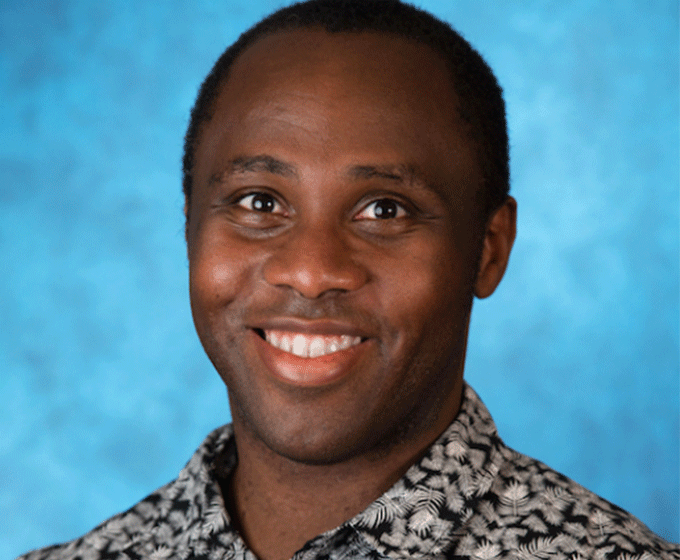
SEPTEMBER 13, 2023 — The Simons Collaboration on Extreme Electrodynamics of Compact Sources (SCEECS) will have a UTSA chapter led by Richard Anantua, assistant professor in the College of Sciences’ Department of Physics and Astronomy. The Simons Foundation recently formed the SCEECS to investigate the electrical and magnetic characteristics of neutron stars and black holes. Anantua is a co-PI on the project.
The Simons Foundation works to advance the frontiers of research in mathematics and the basic sciences. The SCEECS will run from September 1, 2023, to August 31, 2027, and includes a $2.5 million grant, of which $560,000 will be used to support Anantua’s SCEECS-related research activities at UTSA.
The collaboration’s goals include exploring extreme electrodynamics through neutron stars and black holes using theory, simulation and observation, educating and fostering a new and diverse generation of researchers with translatable skills and experience, connecting with scientists working in related fields and providing widespread public outreach.
“Our understanding of classical electrodynamics has been the underpinning of the energy infrastructure that modern civilization depends upon and is at the heart of our technological world,” said Anantua. “Extreme electrodynamics, such as that which occurs in the vicinity of neutron stars and black holes, pushes the frontiers of our knowledge making new solutions to increasingly complex challenges conceivable.”
UTSA was selected as a partner for SCEECS for its notable research enterprise and for Anantua’s past research contributions to the Event Horizon Telescope Collaboration (EHT). Anantua is a leading member of EHT, an international research team that has a large overlap in its members with the SCEECS. EHT utilizes a vast worldwide network of radio telescopes and a technique called interferometry which enables the telescope network to capture high-resolution data as if it were one Earth-sized telescope.
Last year, Anantua modeled and simulated plasma physics that contributed to producing the first ever image of Sagittarius A*, the supermassive black hole located in the center of the Milky Way galaxy. This was only the second time in history that an image of a black hole had been captured.
Anantua broadly specializes in theoretical cosmology, high-energy theoretical astrophysics, high-energy theoretical particle physics such as string theory and condensed matter theory. He develops plasma heating models to help researchers better understand the polarized emission around black holes. Anantua was recently selected for the 2023 Ralph E. Powe Junior Faculty Enhancement Award in recognition of his research contributions.
Anantua earned his Ph.D. and M.S. in physics from Stanford University, his Ed.M. in education and policy management from Harvard University and bachelor’s degrees in physics and philosophy and in economics and mathematics from Yale University.
"The SCEECS collaboration combines the expertise of scientists who think about plasma physics on both large and small scales around the most exotic environments in the universe,” said Brandon Curd, a postdoctoral fellow in the Department of Physics and Astronomy who is assisting Anantua on the project. “With the advent of GPU powered supercomputers, the possibilities for new discoveries are quite tantalizing."
The SCEECS research team at UTSA also includes Lani Oramas, physics doctoral student, and Joaquin Duran and Hayley West, physics master's students.
In addition to UTSA, the SCEECS is comprised of several institutions from around the world including Caltech, Columbia University, Hebrew University of Jerusalem, Illinois State University, Princeton University, Stanford University, Tel Aviv University, The University of Arizona, University of California, Santa Cruz, University of Paris, University of Maryland, University of Toronto, University of Wisconsin—Madison and Washington University in St Louis.
UTSA Today is produced by University Communications and Marketing, the official news source of The University of Texas at San Antonio. Send your feedback to news@utsa.edu. Keep up-to-date on UTSA news by visiting UTSA Today. Connect with UTSA online at Facebook, Twitter, Youtube and Instagram.
Move In To COLFA is strongly recommended for new students in COLFA. It gives you the chance to learn about the Student Success Center, campus resources and meet new friends!
Academic Classroom: Lecture Hall (MH 2.01.10,) McKinney Humanities BldgWe invite you to join us for Birds Up! Downtown, an exciting welcome back event designed to connect students with the different departments at the Downtown Campus. Students will have the opportunity to learn about some of the departments on campus, gain access to different resources, and collect some giveaways!
Bill Miller PlazaJoin us for an intimate evening of cocktails, conversation, and culinary inspiration with Pati Jinich, Emmy-nominated chef and James Beard Award-winning author. Enjoy light bites and signature drinks in the warm, modern setting of Mezquite as Pati connects with guests over her passion for Mexican cuisine and storytelling.
Mezquite Restaurant in Pullman Market, 221 Newell Ave., San Antonio 78215From inspired courses to thoughtful pairings and a rich sense of community, the Ven a Comer Signature Dinner is a night of shared meals, shared stories, and unforgettable flavor.
Stable Hall (Pear Brewery), 307 Pearl Pkwy, San Antonio 78215Come and celebrate this year's homecoming at the Downtown Campus with food, games, giveaways, music, and more. We look forward to seeing your Roadrunner Spirit!
Bill Miller PlazaThe University of Texas at San Antonio is dedicated to the advancement of knowledge through research and discovery, teaching and learning, community engagement and public service. As an institution of access and excellence, UTSA embraces multicultural traditions and serves as a center for intellectual and creative resources as well as a catalyst for socioeconomic development and the commercialization of intellectual property - for Texas, the nation and the world.
To be a premier public research university, providing access to educational excellence and preparing citizen leaders for the global environment.
We encourage an environment of dialogue and discovery, where integrity, excellence, respect, collaboration and innovation are fostered.